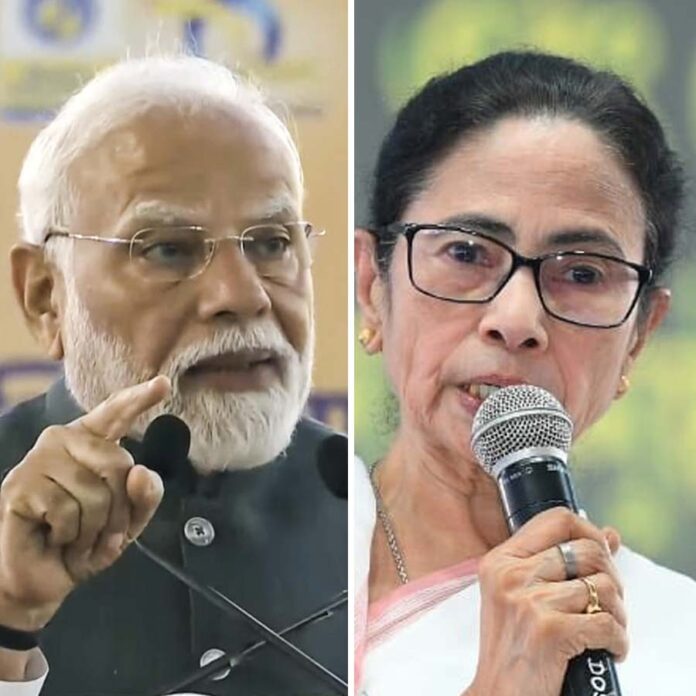Qalam Times News Ntework
Kolkata, May, 29: In a charged and combative exchange ahead of the upcoming Assembly elections, Prime Minister Narendra Modi launched a fierce verbal assault on West Bengal’s ruling Trinamool Congress (TMC), branding the Mamata Banerjee-led government as “nirmam” (cruel), corrupt, and indifferent to the anguish of the people. Addressing an impassioned rally in Alipurduar, the Prime Minister declared that Bengal was in the throes of a deep crisis, and claimed the people were raising their voices in desperate appeal for change.
“There is a crisis of violence and anarchy sweeping through society,” he thundered from the dais. “Our mothers and sisters live in fear of unspeakable crimes, the youth are drowning in unemployment, and the people’s faith in governance is rapidly eroding. Above all, the ruling party is drunk on power, engaged in selfish politics, and robbing the poor of their rights.”
The Prime Minister reserved his sharpest criticism for the infamous teacher recruitment scam, which resulted in the dismissal of over 25,000 educators. “This scam is a stain on the conscience of the TMC government,” he said. “It has shattered the lives of thousands of families. The absence of qualified teachers endangers the future of lakhs of students, and yet those responsible remain defiant. Rather than accepting their guilt, they point fingers at the judiciary.”
Modi also drew attention to the recent communal violence in Murshidabad and Malda, sparked by protests against the Waqf Act. He accused the TMC of willfully turning a blind eye to the unrest, alleging that under the guise of appeasement, it had allowed lawlessness to flourish. “The government remained inert while party workers targeted and burned homes, and the police stood by as mute spectators,” he said. “Is this how governance is conducted?”
He further claimed that in Bengal, nothing is resolved until the courts intervene—a damning indictment of the state’s institutional machinery. “The people of Bengal have lost trust in the TMC. ‘Bengal mein machi cheekh pukaar, nahi chahiye nirmam sarkar’—the state cries out against a government that has lost its soul,” he said.
Turning briefly to national security, the Prime Minister lauded the Armed Forces for Operation Sindoor, a counter-terror strike launched in the aftermath of the Pahalgam attack. “Terrorists had the audacity to target the sacred sindoor of our sisters,” he said. “But our forces responded with valour, striking terror infrastructure with such force that even Pakistan was left shaken. That nation has offered nothing to the world but terror since its inception.”
However, Chief Minister Mamata Banerjee swiftly returned fire, denouncing the Prime Minister’s speech as both shocking and unbecoming, particularly at a time when India is attempting to project global unity against terrorism. “All-party delegations are travelling the world to convey India’s message of zero tolerance for terror,” she said. “And yet, the Prime Minister chooses to stoke divisions at home.”
She accused Modi and the BJP of politicising Operation Sindoor and questioned the sincerity of their national security concerns. “If your heart is truly clean, why have the Pahalgam attackers not yet been apprehended?” she demanded.
Rejecting the BJP’s accusations of cruelty and corruption, Banerjee painted her government as humane and progressive. She turned the tables on the ruling party at the Centre, blaming it for fanning the flames of communal discord. “The BJP was behind the riots in Malda and Murshidabad,” she asserted.
With characteristic defiance, Mamata Banerjee issued a bold challenge to the Prime Minister and his party. “If you have the courage, hold the Bengal Assembly elections tomorrow,” she declared. “We are ready, and Bengal is ready. The people stand with us. And don’t forget—timing is everything.”
As the war of words escalates, it is clear that West Bengal is once again set to become the epicentre of a high-stakes political drama, where the battle is not merely for power, but for the very narrative that will shape the soul of the state.







